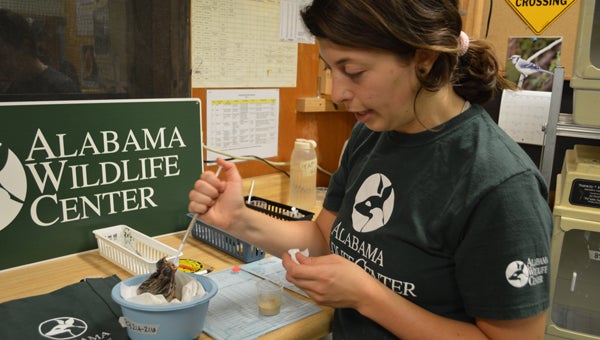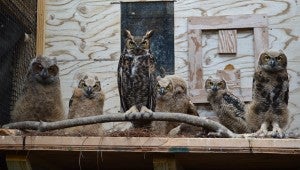Baby Bird Shower ushers in season’s nestlings
Published 10:18 am Thursday, May 5, 2016

A staff member with the Alabama Wildlife Center feeds three baby songbirds with a syringe filled with a blend of nutritional requirements. The birds require feedings every 30 minutes for up to 16 hours. (Reporter photo/Jessa Pease)
By JESSA PEASE / Staff Writer
PELHAM— It’s baby bird season at the Alabama Wildlife Center, which means the center will treat more than 1,000 injured and orphaned baby birds ranging a spectrum of more than 100 species.
Most of these young nestlings require feedings every 30 minutes for up to 16 hours, according to AWC Executive Director Doug Adair.
“It’s a huge amount of animals that desperately need our care, and it requires a lot of our very limited resources,” Adair said. “When you have literally hundreds of injured and orphaned patients you are taking care of, that’s a huge commitment.”

: After these baby great horned owls were well enough, AWC staff members moved them to an outdoor pen where they are continuing the rehabilitation process.
The commitment to provide quality care for those animals, prompted the AWC to start hosting Baby Bird Showers. It serves as a way to share these baby birds with the community and allows them to help provide resources the babies need.
This year’s Baby Bird Shower is Saturday, May 14 from 11 a.m. to 2 p.m. Adair said there will be fun activities for the whole family, crafts for kids and the AWC’s educational raptors will be on display.
Guests can see the babies and how the AWC cares for and feeds them in the clinic. Adair said they’ll be doing some demonstrations, and they’ll have a table displaying some of the foods they utilize for the birds.
“It’s pretty remarkable. Before baby bird season ends we will have treated over 1,000 injured and orphaned baby birds,” Adair said. “Thankfully we are blessed with an amazing group of volunteers that allow us to provide that level of care.”
Depending on the species of bird, Adair said there are many varying requirements. The smallest of babies are fed a special blend of nutritional requirements, which even includes kitten food, through a syringe, and other birds may eat mealworms, small rodents, insects, fruit and more.
The AWC has released a “Baby Bird Wish List” of items that attendees can bring to the shower to support the center’s services. Adair said people can also help by volunteering with the center or becoming a member of the AWC.
While baby birds require a lot of time and attention, Adair said the AWC is in no short supply of injured adult birds. He said there is an influx of migratory birds this time of year, so volunteers and staff members stay busy.
The center is also in the midst of some updates to its exhibits and public areas, which Adair said they are excited about, and they are still focusing on educational programs.
He said the AWC has hosted more than 200 educational programs this year, and Adair said they hope to continue growing that program.
There is no cost to attend the Baby Bird Shower; it is free with park admission. For a full list of wish list items, visit Awrc.org/Baby%20Bird%20Shower.
“We are just looking forward to a fun afternoon on May 14, especially for people who maybe haven’t visited the Alabama Wildlife Center before,” Adair said. “We would love for them to come up and see who we are and what we do.”









